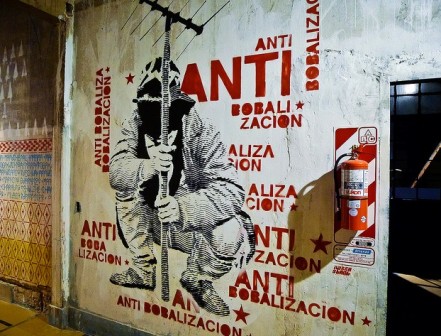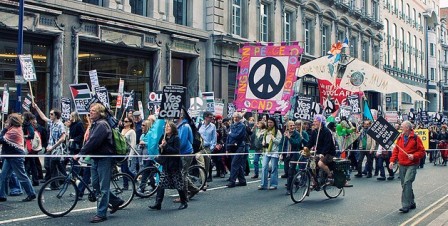Is A Just And Sustainable Global Governance Possible?

NEWS JUNKIE POST
Mar 27, 2011 at 11:56 pmGlobalization is a fact of our daily life. A decision made in the US, China or Europe by governments or corporate entities will affect what we eat, the energy we use, what we buy, and can even have an impact on how we are kept informed of world events. This is, of course, considering that a large fraction of news outlets are controlled by diversified mega-corporations with either an economic or a political agenda at stake in reporting the news.
The Globalization Of The Corporate Empire
In this American lead corporate empire world order, wars and prisons are for profit, and good education and decent health care are for the rich. This world order operates as a wealth and power concentrator for the few. It is the case for the “masters of the universe” on Wall Street as much as it was the case for Mubarak in Egypt. The current globalization profits from disasters, creates disasters, and then profits again from the fixing process. Further, the current world order is a disaster itself for not addressing the urgent global issues of climate change, overpopulation and hunger. It is a world where the rules are dictated by commerce and profit but not by ethic and moral principles.
Recently, billionaire Warren Buffett said:“Yes, there is a class warfare, all right. But it is my class, the rich class, that is making war, and we are winning.” Mr. Buffett is right, the rich and super-rich (like himself) are winning the war on the middle-class and the poor. The very same people who crashed the global economy in 2008 got rewarded by the bail outs, then took away your house, and are now refusing to lend you your own taxpayer’s money. Most US academics agree that wealth inequality in the United States is at historic highs, with some estimates suggesting that the top 1 percent of Americans hold nearly 50 percent of the wealth, topping even the levels seen just before the Great Recession in the 1920s.
But the class warfare mentioned by Warren Buffett is not limited to the United States, it is a global phenomenon. Similar concentration of wealth can be seen in Russia, China and to a lesser extent in Europe. Someone like Gaddafi is similar to Berlusconi in substance if not style: both men are in love with power and want to hold on to it at any cost. However, a few months ago a geopolitical seismic wave challenged the global status quo. At first, it was the Jasmine revolution in Tunisia, then the domino effect reached Egypt, Libya, Yemen and Bahrain. The next countries on the “to do list” of the Arab revolution are Syria, Jordan and Saudi Arabia.
Arab Revolution: A Contagious Force For Global Change
The several Arab revolutions are not a success yet, in both Tunisia and Egypt the Armies are still in charge. Libya has turned into a real battle ground and a political one as well. The global left views the intervention of the coalition as an imperialist move, without even considering that taking the side of Gaddafi would have better served the interest of the empire. After all, Gaddafi had become a reliable business partner just like Mubarak and Ben Ali, and helping to topple him can only fuel the revolution elsewhere in the region. The empire has no interest in fueling a movement which is about to reach the critical oil reserve of Saudi Arabia.
Despite some specific differences between the countries in North Africa and the Middle-East where the revolution is spreading, what is remarkable are the common and universal threads. In all cases, it is about social justice, freedom of speech, and setting up real democracies where the people have a voice. In Egypt, Mubarak and his associates had their hands on all levers of money and power for decades, but curiously income inequality in the United States is more acute than in Egypt. The problems and the aspirations of the people waging the revolution in the Arab world are similar to the ones we are tackling everywhere. Our global system of governance manipulated by a transnational global elite is unjust, amoral, idiotic, unsustainable and is quickly reaching its expiration date. What will replace it is up for debate. Will people withdraw fearfully behind the obsolete notion and false protection of national borders or will we try to be bold and revamp the beautiful idea that was once the United Nations and make it work for the greater universal common good?
Related Articles
- March 7, 2011 Overpopulation, Climate Change, Food Crisis, War: The Horsemen Of Apocalyptic Capitalism
- February 16, 2011 US Foreign And Budget Policies: Putting Bandages On The Titanic
- January 24, 2011 Tunisia, WikiLeaks And Food Crisis: Forces For A Global Revolution
- January 29, 2012 Has Occupy Forgotten Why?
- February 13, 2011 Global Revolution: Will the Many Finally Triumph Over the Few?
- June 4, 2011 America: Sex, Lies And Politicians
















You must be logged in to post a comment Login